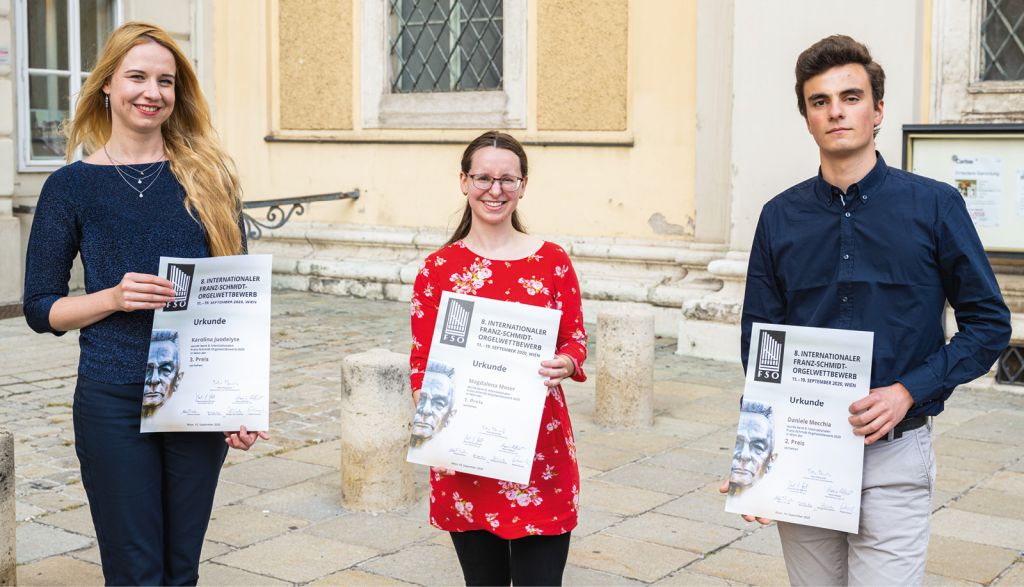The International Franz Schmidt Organ Competition Vienna is held every two years, and the present year witnessed its eighth edition. Twenty-five young organists from twelve countries managed to qualify for the 2020 competition, which was held in cooperation with the mdw; they tested their mettle from 11 to 19 September 2020 at three churches in Vienna’s city centre.
At each biennial edition, the suspense as to how everything will end is palpable. But this time, the suspense was initially all about the beginning—or, more to the point, about whether the competition would be able to take place at all and in full against the backdrop of these unusual times. The elation among the participants and beyond was accordingly great when it was announced that the competition would go forward. The ongoing pandemic did, of course, result in a few cancellations—including by a jury member from Russia. But the majority of the participants were able to come.
The degree of uncertainty around signs that conditions might indeed ultimately let the competition go forward was matched by the assuredness and eloquence with which Peter Hrncirik intrigued the audience with his knowledge of (not only) chromatic signs in his celebratory lecture on “Spicily Beautiful Overtones. Franz Schmidt’s Emancipation of Dissonance” at the opening.
No amount of social distancing, MNP-wearing, or keyboard-disinfecting could distract from this event’s essence—from concentrating on the music and on giving one’s best possible performance, but also from making new contacts, learning from the jury’s feedback, and expanding one’s own musical horizon. Throughout the competition’s (in part public) three rounds on instruments representing entirely different styles, the object was to convince the jury across four centuries’ worth of repertoire.
The first round took place at the mdw’s own church, St. Ursula. On St. Ursula’s neo-Baroque-style organ from 1968 with its distinctive, transparent, and radiant sound, the participants were charged with interpreting works by Johann Sebastian Bach and Georg Muffat as well as music tied to this very place (in the form of Anton Heiller’s Victimae paschali laudes). The second round brought players to the Jesuitenkirche and thus to an instrument oriented on French romanticism. And since the competition programme always contains at least one work by a living composer, this year’s second round featured Sicut Ros Hermon by Thomas Daniel Schlee alongside works from the 19th century. Five participants ultimately made it into the final round, in which they played music by Johann Sebastian Bach and faced the special challenge of the Fredigundis Variations, one of the most important organ works by competition namesake Franz Schmidt.
This competition is one that makes extreme demands on its participants. They need to adapt quickly to organ types that differ drastically from one another in terms of sound, construction, and mechanics. And at the same time, the performers of this competition’s broad programme need to impress the jury in terms of not only their technical abilities and musical personalities but also their ability to do justice to contrasting styles.
The participants’ performances revealed widely varying qualities and musical approaches, and the jury—consisting of Helmut Binder, Bernhard Haas, Margareta Hürholz (substituting at short notice for Liubov Shishkhanova), Robert Kovács, and Artistic Director Peter Planyavsky—was faced with the enormous challenge of determining the best and most promising artists in the respective competition rounds, all of which were conducted anonymously. In the end, the prizes went to
Magdalena Moser (Austria) – 1st prize
Daniele Mecchia (Italy, mdw student) – 2nd prize
Karolina Juodelyte (Lithuania) – 3rd prize
With her interpretations (not least of Schmidt’s music), first prize winner Magdalena Moser won over the jury and joined forces with the other two prizewinners to wow the audience at the prizewinners concert, which took place in the beautiful atmosphere of the Schottenkirche.


